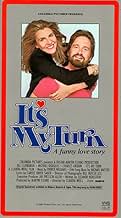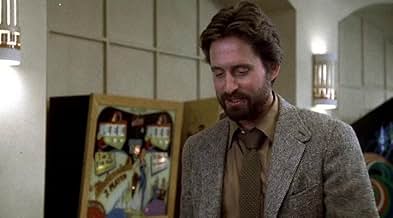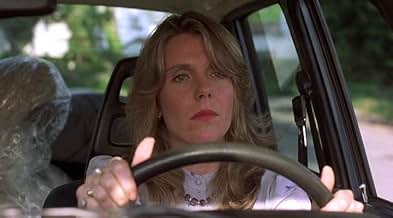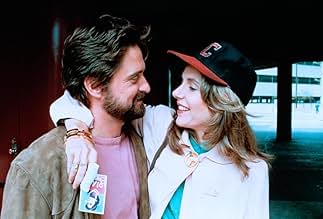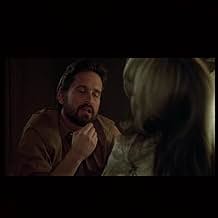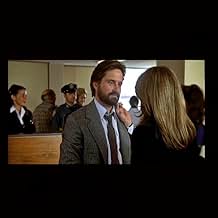Une professeure de mathématiques stressée se rend au mariage de son père et tombe en amour avec le fils de l'épouse de son père, un joueur de baseball professionnel prématurément à la retrai... Tout lireUne professeure de mathématiques stressée se rend au mariage de son père et tombe en amour avec le fils de l'épouse de son père, un joueur de baseball professionnel prématurément à la retraite.Une professeure de mathématiques stressée se rend au mariage de son père et tombe en amour avec le fils de l'épouse de son père, un joueur de baseball professionnel prématurément à la retraite.
- Prix
- 1 nomination au total
- Gail
- (as Diane Wiest)
- Professor
- (as Ronald C. Frazier)
- Professor
- (as Edwin J. McDonough)
- Jerry Lanz Man
- (as Ralph Mauro)
Avis en vedette
Like they say, there are too many people in their relationship. That may be the point of the movie but it makes it difficult to root for them to make it. It would help if Homer is a stiff. He needs to have no personality and no chemistry with Kate. There are two ways to take this relationship movie. It's either modern and edgy or it's convoluted modern gobbledygook. Homer is a perfectly good guy and that's a problem. For the climatic talk between them to work, it needs to be setup much better in the earlier interaction. The script got a Razzie nomination although I don't think it deserves it. There are some issues but they are not fatal. There is also a common complaint about the movie's feminism. Let's just say that some boys have very thin skin. Maybe she didn't show enough T&A.
Here, the protagonist is perhaps the most glamorous mathematics professor ever (she wears stilettos to class, but earthy gal that she is, removes them while solving equations at the blackboard). She's got relationship issues with her widowed dad who's remarrying, and with her divorced live-in boyfriend, plus she's conflicted about whether to take a new job in a new city that pays much more, but won't allow her to continue her research. She breezily describes her various complications as "modern problems," which tells you that the creators here felt they were at the very cutting edge of portraying the quintessential "liberated" woman. Laura Linney's character in "You Can Count On Me" had a similarly complicated life, but that film didn't feel the need for its characters to be so self-aware.
Michael Douglas enters the picture to help her figure out where/how to get the healthy, giving relationship that everyone around her seems to have, and that therefore is "her turn" to get (get it?)
This is a decent movie that actually doesn't feel particularly dated, (save for Clayburgh's Oscar-bait "big scene" towards the end) despite its obvious 70's era feminist overtones. But perhaps because of its agenda, the romance doesn't exactly sweep you off your feet.
As with most movies from the 80s, part of the fun is seeing what stars/faces of the future show up. Here, we get a young Daniel Stern, almost unrecognizable as Clayburgh's star pupil, and future "Law and Order" District Attorneys Steven Hill and Dianne Wiest.
It seems that a lot of people consider the main character to be a feminist, and I'm not sure I agree. She seems like she tries to create her life to satisfy males that aren't really emotionally available to her, and comes off as desperate and naive in the process. I am glad that, unlike many typical romantic comedies, she doesn't end up giving up her life for a man. Unfortunately, it seems more situational from the men's lives, as opposed to her own character growth that keeps her from making the mistakes. Hence why I'm not sure I'd call her character a feminist. But I'm still glad it turned out alright in the end. She does end up showing the signs of growth at the very end as a result of the other events, and so that's something good.
The movie didn't make me angry at any point. It made me a bit bored, but not angry. A lot of movies have made me angry for various reasons lately. Since this movie, although a bit of a mediocre film, didn't elicit any strong negative emotions, I gave it a five instead of a four. The acting could have been better, although that was likely a poor script issue. It could have had way more depth, and been pretty good potentially. But, it was alright, and I don't feel it was a complete waste of time.
Le saviez-vous
- AnecdotesKate Gunzinger's proof of the "Snake Lemma" at the very beginning of the movie is technically perfect. Charles A. Weibel's book "An Introduction to Homological Algebra" (1994, Cambridge University Press) includes the following statement "We will not print the proof (of the Snake Lemma) in these notes, because it is best done visually."
- GaffesThe font of the F changes during the course of solving the Snake Lemma in the beginning of the film.
- Citations
[First lines.]
Kate Gunzinger: Let me just show you how to *construct* the map S, which is the fun of the lemma anyhow, okay? So you assume you have an element in the kernel of gamma, that is, an element in C, such that gamma takes you to 0 in C-prime. You pull it back to B, via map g, which is surjective...
Cooperman: Hold it, hold it, hold it. That's -- that's not unique.
Kate Gunzinger: Yes, it is unique, Mr. Cooperman. Up to an element of the image of f, all right? So we've pulled it back to a fixed B here. Then you take beta of B, which takes you to 0 in C-prime, by the commutivity of the diagram. It's therefore in the kernel of the map g-prime, hence is in the image of the map f-prime, by the exactness of the lower sequence...
Cooperman: No.
Kate Gunzinger: ...so we can pull it back...
Cooperman: No.
Kate Gunzinger: ...to an element in A-prime...
Cooperman: It's not well defined!
Kate Gunzinger: ...which it turns out is *well* defined *modulo* the image of alpha. And thus defines the element in the co-kernel of alpha...
[draws arrow on diagram]
Kate Gunzinger: and that's the "snake"! And on Monday, we'll address ourselves to
[Cooperman raises hand]
Kate Gunzinger: the co-homology of groups... and Mr. Cooperman's next objections.
- Bandes originalesIt's My Turn
Music by Michael Masser
Lyrics by Carole Bayer Sager
Sung by Diana Ross
Produced by Michael Masser
(P) 1980 Motown Records
Meilleurs choix
- How long is It's My Turn?Propulsé par Alexa
Détails
- Date de sortie
- Pays d’origine
- Site officiel
- Langue
- Aussi connu sous le nom de
- It's My Turn
- Lieux de tournage
- Ville de New York, New York, États-Unis(Exterior, one week)
- société de production
- Consultez plus de crédits d'entreprise sur IMDbPro
Box-office
- Brut – États-Unis et Canada
- 11 000 000 $ US
- Durée1 heure 31 minutes
- Couleur
- Mixage
- Rapport de forme
- 1.85 : 1


